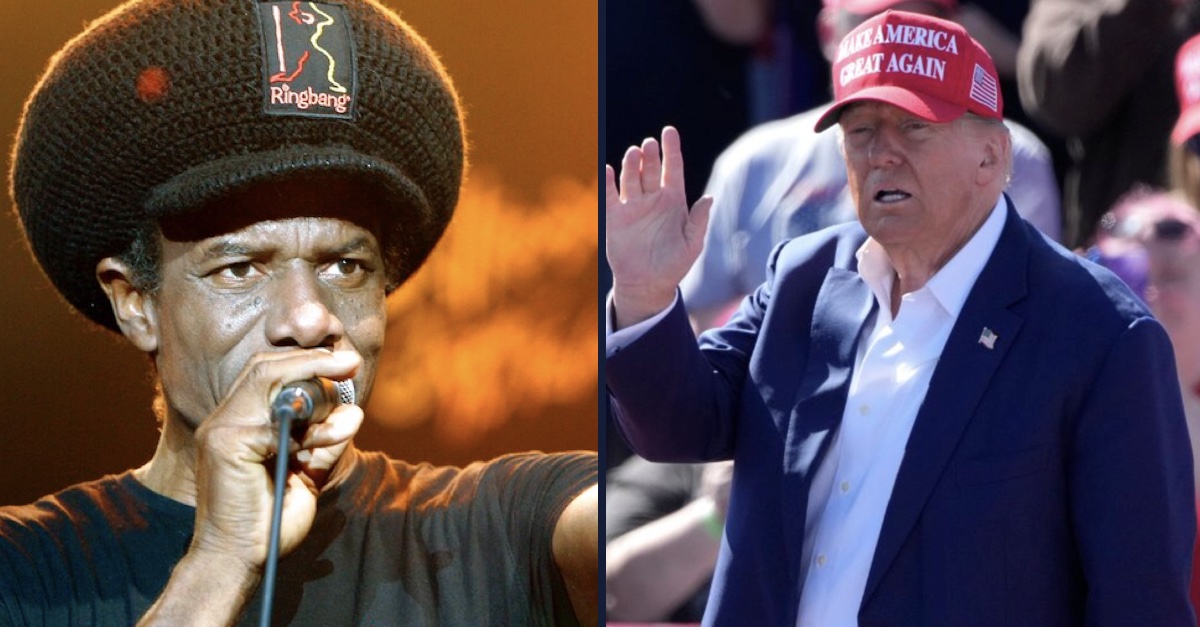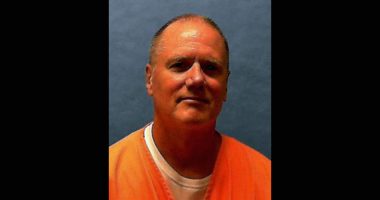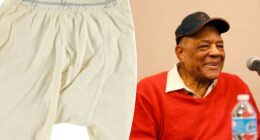
Left: British reggae-rock musician Eddy Grant, performing during the 42nd Montreux Jazz Festival in Montreux, Switzerland, in 2008, sued Trump over the use of his 1980s hit Electric Avenue in a Trump campaign animated video that mocked his then opponent Joe Biden. (AP Photo/KEYSTONE/Jean-Christophe Bott, File). Right: Republican presidential nominee former President Donald Trump waves as he departs a campaign event at Central Wisconsin Airport on Sept. 7, 2024, in Mosinee, Wis. (AP Photo/Morry Gash).
After a multi-year legal battle, President-elect Donald Trump and Guyanese-British singer Eddy Grant settled a copyright lawsuit over the unauthorized use of the 1984 hit funk song “Electric Avenue.”
In August 2020, Trump’s then-Twitter account posted a 55-second-long animated clip mocking Joe Biden months before the latter was elected president. In the video, a cartoon version of Biden manually pumps the handcar of a train moving quite slowly through a snow-covered town. As embarrassing video clips of Biden play in the background, the popular song provides the non-diegetic soundtrack.
In September 2020, Grant sued Trump and his campaign in the Southern District of New York for violating the songwriter’s copyright.
“I call upon such arbiter, as is responsible for this sordid abuse, to come forward like a man and let’s sort this thing out, in the way that America demands when such issues are to be sorted, especially when they are wrong,” Grant said at the time he filed the lawsuit. “Mr. Trump, I am calling on you. You are the final arbiter and I await the word from you.”
The word finally came — over four years later.
“It having been reported to this Court that the parties have settled this action, it is hereby ordered that this matter be discontinued with prejudice but without costs; provided, however, that within 30 days of the date of this order, counsel for the plaintiff may apply by letter for restoration of the action,” U.S. District Judge John G. Koeltl wrote in a Wednesday order.
As is often the case in settlements reached between parties, the terms of the agreement were not publicly disclosed.
Grant’s attorney, Brian Caplan, a partner with New York City-based law firm Reitler Kailas & Rosenblatt, said the controversy had been resolved “to the mutual satisfaction of both parties” in a statement provided to the Reuters wire service on Thursday.
The legal battle between the 45th and 47th president and the co-founding member of the Equals — famous for their ska-influenced rock ‘n’ roll single “Baby, Come Back” — has been a long-and-winding road.
Trump and his team denied producing the video that used “Electric Avenue” — a discordantly upbeat number with lyrics that mourn the police violence and racial unrest from the 1981 Brixton riots in London — and insisted they merely shared the clip.
And the case moved slowly. The plaintiff’s strategy finally bore some fruit — in the way of discovery — in 2022.
More Law&Crime coverage: ‘Electric Avenue’ musician seeks to depose Trump campaign social media director about using song in ad that mocked Joe Biden
Depositions of Trump and his social media director, Dan Scavino, would come to shed light on the origins of the video.
But the legal wrangling would go on with motions, orders, switched-out attorneys, and one judicial reassignment for years.
In September, the court issued an order granting summary judgment to Grant — summing up many of the facts in the case.
“Scavino testified that he saw the Video on a Trump supporter’s social media page either on the same day or the day before he posted the Tweet. Scavino also testified that he spoke with former President Trump before posting the Tweet and that former President Trump ‘let [him] go with [his] instinct on it and post it,”” the judge recounted. “Former President Trump testified that the Video was taken from the internet and posted on Twitter.”
As Koeltl saw it, there was simply “no dispute that the composition and the sound recording of the musical performance for ‘Electric Avenue’ were used without permission and that the Composition was copyrighted. The only real question was whether Trump had a “fair use” defense.
That question was answered in the negative.
“In this case, the Video has a very low degree of ‘transformativeness,’ if any at all,” the judge wrote — citing one of the legal standards for fair use in copyright law. “As this Court found in denying the defendants’ motion to dismiss, the Video ‘is best described as a wholesale copying of music to accompany a political campaign ad.’”
All that remained after the court ruled in Grant’s favor on the motion for summary judgment was the matter of damages.
Now, the once-and-future president has come to agree with the anti-apartheid singer-songwriter about the “work to be done.”
In his order, Koeltl advised both sides to act quickly if they wanted to keep any aspect of the lawsuit in the court system.
“[I]f the parties wish for the Court to retain jurisdiction for the purpose of enforcing any settlement agreement, they must submit the settlement agreement to the Court within the same thirty-day period to be so-ordered by the Court,” the order goes on. “Unless the Court orders otherwise, the Court will not retain jurisdiction to enforce a settlement agreement unless it is made part of the public record. All pending motions are dismissed as moot. All conferences are canceled. The Clerk of Court is directed to close this case.”
Have a tip we should know? [email protected]









